Related Research Articles
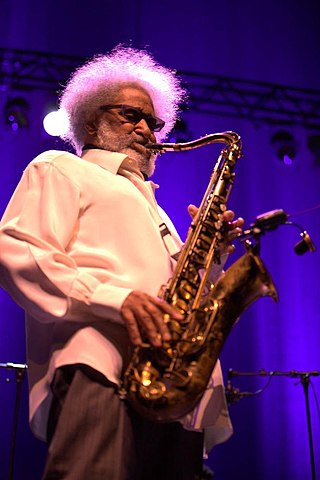
Walter Theodore "Sonny" Rollins is an American retired jazz tenor saxophonist who is widely recognized as one of the most important and influential jazz musicians.

Melbourne Robert Cranshaw was an American jazz bassist. His career spanned the heyday of Blue Note Records to his later involvement with the Musicians Union. He is perhaps best known for his long association with Sonny Rollins. Cranshaw performed in Rollins's working band on and off for over five decades, starting with a live appearance at the 1959 Playboy jazz festival in Chicago and on record with the 1962 album The Bridge.

Sonny Stitt was an American jazz saxophonist of the bebop/hard bop idiom. Known for his warm tone, he was one of the best-documented saxophonists of his generation, recording more than 100 albums. He was nicknamed the "Lone Wolf" by jazz critic Dan Morgenstern because of his tendency to rarely work with the same musicians for long despite his relentless touring and devotion to the craft. Stitt was sometimes viewed as a Charlie Parker mimic, especially earlier in his career, but gradually came to develop his own sound and style, particularly when performing on tenor saxophone and even occasionally baritone saxophone.
The ragtime progression is a chord progression characterized by a chain of secondary dominants following the circle of fifths, named for its popularity in the ragtime genre, despite being much older. Also typical of parlour music, its use originated in classical music and later spread to American folk music. Growing, "by a process of gradual accretion. First the dominant chord acquired its own dominant...This then acquired its dominant, which in turn acquired yet another dominant, giving":
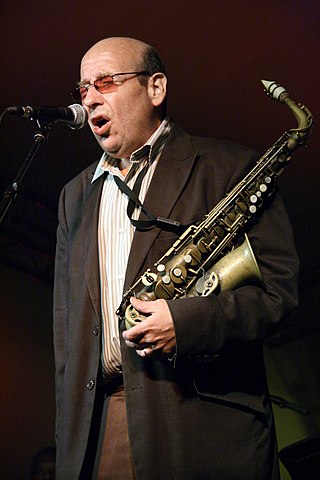
Bob Mover is an alto, tenor and soprano jazz saxophonist and a vocalist. He has been described as "the highly respected and extraordinary alto saxophonist, teacher, and theoretician".

Saxophone Colossus is the sixth studio album by American jazz saxophonist Sonny Rollins. Perhaps Rollins's best-known album, it is often considered his breakthrough record. It was recorded monophonically on June 22, 1956, with producer Bob Weinstock and engineer Rudy Van Gelder at the latter's studio in Hackensack, New Jersey. Rollins led a quartet on the album that included pianist Tommy Flanagan, bassist Doug Watkins, and drummer Max Roach. Rollins was a member of the Clifford Brown/Max Roach Quintet at the time of the recording, and the recording took place four days before his bandmates Brown and Richie Powell died in a car accident on the way to a band engagement in Chicago. Roach appeared on several more of Rollins' solo albums, up to the 1958 Freedom Suite album.

Soul Station is an album by American jazz saxophonist Hank Mobley recorded on February 7, 1960 and released on Blue Note later that year. Mobley's quartet features rhythm section Wynton Kelly, Paul Chambers and Art Blakey.
"Airegin" is a jazz standard composed by American jazz saxophonist Sonny Rollins in 1954. Rollins chose the name "Airegin", as it is an anadrome of "Nigeria".
"Oleo" is a hard bop composition by Sonny Rollins, written in 1954. It has become a jazz standard, and has been performed by numerous jazz artists such as Miles Davis, John Coltrane, and Bill Evans.

Coltrane Jazz is a studio album by the jazz musician John Coltrane. It was released in early 1961 on Atlantic Records. Most of the album features Coltrane playing with his former Miles Davis bandmates, pianist Wynton Kelly, bassist Paul Chambers and drummer Jimmy Cobb during two sessions in November and December, 1959. The exception is the track "Village Blues", which was recorded October 21, 1960. "Village Blues" comes from the first recording session featuring Coltrane playing with pianist McCoy Tyner and drummer Elvin Jones, who toured and recorded with Coltrane as part of his celebrated "classic quartet" from 1960 to 1965.
"You Don't Know What Love Is" is a popular song of the Great American Songbook, written by Don Raye (lyrics) and Gene de Paul (music) for the Abbott and Costello film Keep 'Em Flying (1941), in which it was sung by Carol Bruce. The song was deleted from the film prior to release. The song was later included in Behind the Eight Ball (1942), starring the Ritz Brothers. "You Don't Know What Love Is" was again sung by Carol Bruce; it was her third and final film until the 1980s.
"Lover Man " is a 1941 popular song written by Jimmy Davis, Roger ("Ram") Ramirez, and James Sherman. It is particularly associated with Billie Holiday, for whom it was written, and her version was inducted into the Grammy Hall of Fame in 1989.

Tenor Madness is an album by jazz musician Sonny Rollins released in October 1956 by Prestige Records. It is most notable for its title track, the only known recording featuring both Rollins and John Coltrane.
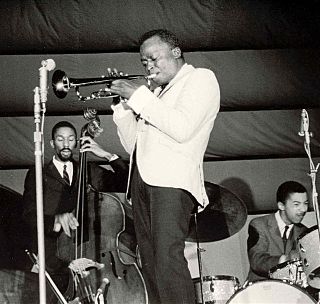
The Miles Davis Quintet was an American jazz band from 1955 to early 1969 led by Miles Davis. The quintet underwent frequent personnel changes toward its metamorphosis into a different ensemble in 1969. Most references pertain to two distinct and relatively stable bands: the First Great Quintet from 1955 to 1958, and the Second Great Quintet from late 1964 to early 1969, Davis being the only constant throughout.

Work Time is an album by jazz saxophonist Sonny Rollins, recorded for the Prestige label, featuring performances by Rollins with Ray Bryant, George Morrow, and Max Roach.
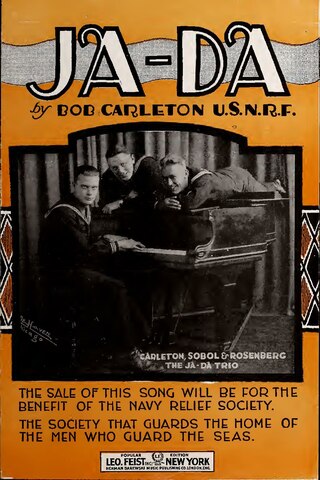
"Ja-Da " is a hit song written in 1918 by Bob Carleton. The title is sometimes rendered simply as "Jada." The song has flourished through the decades as a jazz standard.

The Bridge is a studio album by jazz saxophonist Sonny Rollins, recorded in 1962. It was Rollins' first release following a three-year sabbatical and was his first album for RCA Victor. The saxophonist was joined by the musicians with whom he recorded for the next segment of his career: Jim Hall on guitar, Bob Cranshaw on double bass and Ben Riley on drums.

The Solo Album is a live album featuring a solo performance by jazz saxophonist Sonny Rollins recorded at the Sculpture Garden of the Museum of Modern Art in New York City and released on the Milestone label in 1985.
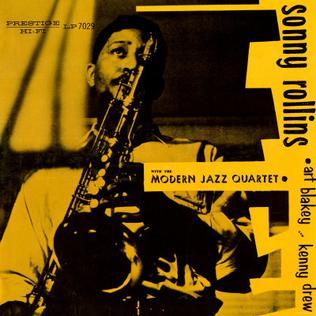
Sonny Rollins with the Modern Jazz Quartet is a 1956 compilation album by jazz saxophonist Sonny Rollins, featuring his earliest recordings for the Prestige label under his leadership, including four tracks performed by Rollins with the Modern Jazz Quartet, eight tracks where Kenny Drew and Art Blakey replace Lewis, Jackson, and Clarke, and one track with Miles Davis on piano.

By the end of the 1940s, the nervous energy and tension of bebop was replaced with a tendency towards calm and smoothness, with the sounds of cool jazz, which favoured long, linear melodic lines. It emerged in New York City, as a result of the mixture of the styles of predominantly white swing jazz musicians and predominantly black bebop musicians, and it dominated jazz in the first half of the 1950s. The starting point were a series of singles on Capitol Records in 1949 and 1950 of a nonet led by trumpeter Miles Davis, collected and released first on a ten-inch and later a twelve-inch as the Birth of the Cool. Cool jazz recordings by Chet Baker, Dave Brubeck, Bill Evans, Gil Evans, Stan Getz and the Modern Jazz Quartet usually have a "lighter" sound which avoided the aggressive tempos and harmonic abstraction of bebop. Cool jazz later became strongly identified with the West Coast jazz scene, but also had a particular resonance in Europe, especially Scandinavia, with emergence of such major figures as baritone saxophonist Lars Gullin and pianist Bengt Hallberg. The theoretical underpinnings of cool jazz were set out by the blind Chicago pianist Lennie Tristano, and its influence stretches into such later developments as Bossa nova, modal jazz, and even free jazz. See also the list of cool jazz and West Coast musicians for further detail.
References
- ↑ Fox, Charles; McCarthy, Albert (1960). Jazz on record: a critical guide to the first 50 years, 1917–1967. Hanover Books. p. 62.
- ↑ Martin, Henry; Waters, Keith (2010). Jazz: The First 100 Years. Cengage Learning. p. 248. ISBN 978-1-4390-8333-8.
- ↑ Fox, Charles; McCarthy, Albert (1960). Jazz on record: a critical guide to the first 50 years, 1917–1967. Hanover Books. p. 15.
- ↑ "More Excerpts from Saxophone Colossus," April 9, 2023. https://www.kevinsun.com/2023/04/more-excerpts-from-saxophone-colossus.html. Retrieved December 16, 2024.